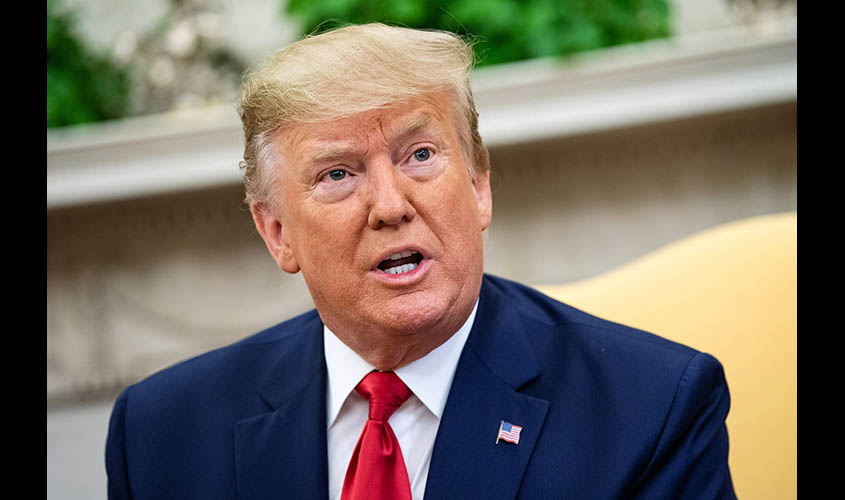US President Donald Trump’s repeated offers to mediate between India and Pakistan on the Kashmir issue, coming so soon after the “Howdy, Modi!” show of bonhomie, may lead to these being seen as a failure of Indian diplomacy to convince him to be hands off on the matter. Or even symptomatic of some underlying troubles haunting India-US ties. But such reasoning borders on the simplistic as this constant refrain may have more to do with President Trump’s personality than with India. Seemingly, Mr Trump has started fancying himself as a peacemaker. He is searching for his presidential legacy, and believes that he will be remembered by posterity for solving the most complicated of the world’s problems. And what is more complicated than India-Pakistan relationship? This is one way of explaining Mr Trump’s concerted effort to solve the Korean situation as well. To be fair to him, he had made some headway there, especially in 2018, courtesy his meeting with North Korean leader Kim Jong-un in Singapore. In fact some progress towards peace—and perhaps the possibility of even a future reunification—has been made between the two Koreas. There was also talk of dismantling North Korea’s nuclear and missile programmes. However, the second summit between President Trump and President Kim at Vietnam’s Hanoi failed earlier this year. As The Sunday Guardian reported at the time, the North Korean complaint was that Donald Trump seemed to be a man who was “clearly not the person in command” and it was US National Security Advisor John Bolton, a war hawk, and Secretary of State Mike Pompeo who were peddling a hard line against Kim. So much so that the North Koreans feared that their President, if he agreed to give up his nuclear missiles, would face a similar fate that Libyan strongman Muammar Gaddafi and Iraqi ruler Saddam Hussain faced. But now that Trump has sacked John Bolton, in the US this week he had a meeting with his South Korean counterpart, Moon Jae-in, during which both of them discussed a possible third summit between Trump and Kim sometime in the near future. Much of Donald Trump’s Korean outreach has to do with countering China and loosening the red dragon’s hold on the Korean peninsula. In the process, if he can solve one of the most complicated problems of the world, then kudos to him. In fact such is his wish to be seen as a “peacemaker” that he went to the extent of inviting the radical and virulent terrorist outfit, the Taliban, to the US President’s country retreat, Camp David, ostensibly to talk “peace” with them, while overruling objections from within his own administration. Much of the push for peace with the Taliban may have originated from the bad advice offered by US ambassador to Afghanistan, Zalmay Khalilzad, who, as this newspaper has been pointing out, is part of the radical Wahhabi lobby that operates in Washington, but Khalilzad would not have been able to make much headway unless the US President himself was more than willing to lend him an ear. Obviously, the businessman in Donald Trump does not like war, because war is bad for business. He is definitely for conflict resolution and mediation. The sacking of John Bolton, who wanted to push US towards war with Iran, may be seen from this light. Add another degree of personal ambition to this—especially since it is also becoming apparent that President Trump has started fancying himself as a potential Nobel Peace Prize winner. In fact, South Korean President Moon Jae in went to the extent of suggesting last year that the US President should be given the Nobel Peace Prize for his Korean foray, a suggestion heavily endorsed by Mr Trump’s loyal base of supporters. No wonder Mr Trump gave vent to his ambition this week, when he said he didn’t know why Barack Obama was given the Nobel Peace Prize, at the start of his presidency when he had achieved “nothing”, when it was he who deserved it. Of course he was not exaggerating. It is said that “endless war” was Obama’s legacy, with over 26,000 bombs dropped in just his last year as President in 2016. Compared to this, Trump is busy doing trade war, not much of actual war except in pockets. Thus, while dealing with Trump, India should not forget that it’s not just US’ geopolitical needs that are shaping policy, but also the President’s character traits and personal ambitions. This is a reality that India will have to live with as long as Donald Trump is the President of the United States. Of course Prime Minister Narendra Modi has been parrying Mr Trump’s offers brilliantly, cordially pointing out that India is capable of handling the problem on its own. And there has been some acknowledgement of this fact from the US President as well. But how long this stays the case, remains to be seen. India must drive home the message that until and unless Pakistan ceases to be the font of global terror, there cannot be talks. Anyway, India’s stated policy is no third party mediation. Also, Mr Trump’s refusal to brand Pakistan as the biggest terror factory of the world is not helping his case as a “peacemaker”. Now, what India needs to watch out for is how Pakistan and the Wahhabi lobby exploit Donald Trump’s wish to be the peacemaker.

